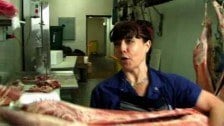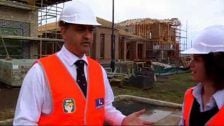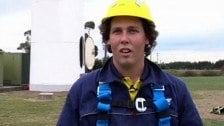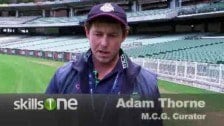The Apprentice Jockey
Champion Tasmanian apprentice-jockey, Daniel Ganderton, has enjoyed a sensational winning start to his new riding career, capturing an impressive winning double at Newcastle a few weeks ago.
Having his first ride for his new master Gai Waterhouse, Ganderton jumped aboard the 9-1 chance and first-starter 'The Third Bird' and saluted the judge in grand style in the 3yo fillies 1200m maiden.
If that wasn't exciting enough, Ganderton came out two races later and stole winning honours aboard the Michael Kent and Nick Moraitis owned 'Ladalileo' in the maiden 1400m. This was a superb effort by Ganderton, who is only a third year apprentice, capturing two winners from his only two stable rides on the day.
Gai Waterhouse said of this: Two from two is an impressive strike rate and I'm absolutely delighted. Daniel only arrived at my stable on Monday of this week and I'm thrilled by the way he has settled in so quickly. He has hit the ground running with two really intelligent rides, showing great natural pace to lead on his second winner Ladalileo and he is much stronger than his claim suggests. You'll be seeing lots of him in the next few months.
Daniel Ganderton was Champion Apprentice in Tasmania last season and is well in front this term, where Gai Waterhouse has brought him over to work for her in Sydney. Sydney's leading jockey Blake Shinn was instrumental in Ganderton joining the Waterhouse stable. I had been watching Daniel ride in Tasmania and was very impressed. I also liked his manner and communication skills when interviewed on TV so I suggested to Gai and Robyn Hartney they should have a talk to him about coming to Sydney. He couldn't have asked for a better start and I'm sure he will be well utilized by the Sydney trainers.
Daniel has ridden close to 90 winners and is fantastic value, claiming 3kgs in the metropolitan area, 1.5kgs at the provincials and nil in the country. The 19 year old was apprenticed to Leon Wells, the same trainer Craig Newitt was indentured to before joining Lee Freedman in Victoria. Daniel loves his job where he is proving himself a highly competent young jockey, and rubbing shoulders with the best. He says there is nothing better than riding a winner and getting paid to do it. The only downside to the job, Daniel says, is the 3am starts!
How can I do what Daniel is doing?
TAFE NSW offers a Certificate IV in Racing (Jockey). This course is for people who work or want to work in the thoroughbred racing industry as a jockey. A jockey is a person who is licensed to ride in industry-regulated competition. Jockeys implement the delegated instructions of a trainer who has overall responsibility for a racing stable. The course provides vocational education and training in practical skills relevant to the care, handling, husbandry and riding of thoroughbred horses, and the underpinning knowledge required to apply those skills to a variety of workplace situations in the thoroughbred sector of the racing industry. You will develop a range of skills in handling horses racing at speed and caring for highly strung, expensive animals that can easily injure themselves or their handlers. You will learn about the responsibility and duty of care involved in taking sole charge of an animal in situations where a danger exists to the animal, the handler, or the general public, such as riding in a race and during track work. You will learn to organise your own work within known routines and exercise judgement and problem solving skills where needed. The course prepares you to work as an independent professional sports person licensed by the NSW Thoroughbred Racing Board who can communicate the performance and fitness of a horse to trainers at the end of a race. You learn about racing rules and legal procedures as well as how to manage your business affairs and apply sports science to your role.
As a licensed jockey, graduates possess the highest level of race riding and horse handling skills that require application of problem solving skills to unpredictable problems. As some of the jockey's income is derived from percentages of stake money the jockey must compete with peers to obtain the best mounts. This requires marketing and communication skills and the ability to operate autonomously in the choice of mounts, trainers and venues. Jockeys are required to exhibit a high degree of decision-making skill during races, to exercise judgement when choosing mounts and have an ability to assess form and discriminate between mounts. The communication of performance and fitness of a horse to trainers and owners at the end of a race is a critical part of a jockey's role. This requires in-depth understanding of anatomy, physiology and health of the horse applied in the context of a competitive environment. Jockeying is one of the few occupations where there is an absolute restriction on the weight of the participant, a requirement for a high degree of physical fitness and a constant reliance on performance to obtain income. It is also an occupation where non-adherence to rules or poor performance can result in fines or suspension from riding. Consequently, knowledge of rules and legal procedures is essential and the ability to defend reputation and livelihood in stewards' inquiries is an important requirement for a jockey. As racing is conducted at a wide range of local, national and international venues a jockey is required to identify, analyse and evaluate information from a variety of sources.











